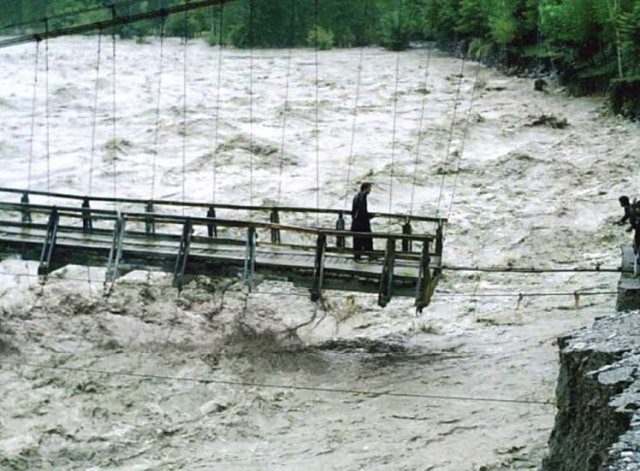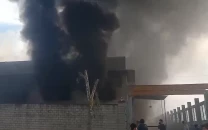G-B government failed its people
Attabad landslide disaster and floods mark a bad year for G-B's newly-elected government.

Lack of capacity to deal with crises of such magnitude further worsened the situation in G-B, which was already reeling due to shortage of funds. The government estimated Rs150 million in losses.
Faced with various challenges and limited resources, the government’s performance has nevertheless disappointed people at large. Most of the promises made by the government – even those made by Prime Minister Yousaf Raza Gilani on the eve of general elections – have not been fulfilled.
PM Gilani had promised that Gilgit and Skardu will be declared “big cities” – meaning the development activities and funds made available for the two cities will be increased manifold. He had also promised that the airports in the two cities will be upgraded. People responded.
Mehdi Shah, the chief minister of G-B, took oath of office in December 2009, while his cabinet was sworn-in during April 2010. It has been ten months since the G-B government has been fully operational.
Tufail Ahmed, who runs a business in Gilgit, said that Gilani’s promise on the eve of elections was just a political gimmick. “Both of the prime minister’s promises were not fulfilled. They (Pakistan Peoples Party) just wanted to expand their rule to this region,” he said while talking to The Express Tribune on Wednesday.
The government had announced to set up a medical college in the region but nothing became of that either.
Waseem Iqbal, a student with once high hopes and expectations from this government, has also been disenchanted by their performance.
“I was hoping that the new government would take concrete measures for the relief of the common man, but it did not happen,” he said, and added, “The prices of daily-use items are soaring. There is shortage of fuel, electricity and firewood etcetera and winter has just started to set in.”
Hafizur Rehman, the Pakistan Muslim League-Nawaz’s (PML-N’s) chief in G-B also criticised the Pakistan Peoples Party government for failing to solve the boundary issue with Khyber-Pakhtunkhwa (K-P).
“[K-P] is encroaching on our land in Diamer and Shandur but the government has been able to do nothing about it,” he said. The PML-N president of G-B chapter also criticised the government on its inability to address the Diamer-Basha dam royalty issue.
Just a year ago the promulgation of self-governance and empowerment order 2009 had sent a wave of jubilation across the region, raising people’s expectations for the new government, which had promised them their own chief minister and governor with powers to take decisions on issues relevant to G-B.
Critics of the self-governance order, however, say that the region got both a chief minister and a governor, but without the authority to exercise powers enshrined in the constitution.
Farooq Ahmed, a lawyer, said the self-governance package was confusing as it did not have constitutional backing.
Amjad Hussain, member of the G-B council, defended his government’s less-than-stellar performance. He said the government made several achievements in its short duration, despite facing two major natural calamities.
“[We set up the] new Hunza-Nagar district, raised government officials’ salaries, worked for flood and Attabad victims’ rehabilitation, dealt with [Internally Displaced Persons], and raised the boundary issues with K-P and the federal government,” Hussain said, adding that the G-B’s government was “working to fulfil rest of the promises”.
Published in The Express Tribune, October 29th, 2010.


















COMMENTS
Comments are moderated and generally will be posted if they are on-topic and not abusive.
For more information, please see our Comments FAQ